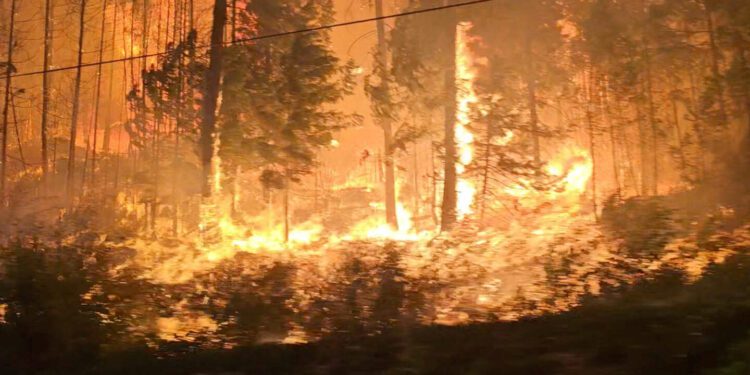Near Sorrento, British Columbia (Canada), August 18, 2023. NIKKI GOYER / NIKKI GOYER VIA REUTERS
Greece, Mayotte, Algeria, the United States… Once again this summer, fires have been raging around the globe. But it’s the previous fire season that a report published on Wednesday, August 14 looks back on in detail. It recalls the extent to which the extreme events observed in Canada, the Amazon and Greece in particular have generated significant CO2 emissions, thereby contributing to global warming. It also underlines that, as part of a downward spiral, these gigantic fires have themselves been made more likely by climate disruption.
The first edition of the “State of Wildfires,” published in the journal Earth System Science Data and produced by the University of East Anglia and other UK-based institutions, is intended to be updated annually. “The aim of this report is to take stock of extreme events in a global way, and to analyze why they have occurred, to what extent climate disruption has favored them, and what the chances are that they will recur between now and 2100,” explained its lead author, Matthew Jones. “This work should also help us to become more responsive in providing concrete answers to political leaders when fires are underway.”
Between March 2023 and February 2024, forest fires emitted 8.6 billion metric tons of CO2, a figure 16% higher than the average for the last 20 years. This increase is largely explained by the outsized fires that ravaged Canada, generating a quarter of total emissions. Conversely, the fact that the African savannahs experienced fewer fire episodes than usual prevented record global emissions.
Read more Subscribers only Canada’s record-breaking fire season burns on
Other “hotspots” in the 2023-24 season included parts of the Amazon in Latin America, as well as Hawaii, Chile and Greece. Tens of people were killed, hundreds of thousands evacuated, homes and infrastructure destroyed, ecosystems and carbon sinks wiped out, and these events are going to have long-term impacts on human health through degraded air quality.
High temperatures and drought
“What has happened in Canada is a new signal of a trend towards changing fire regimes that has been emerging for two decades,” explained Jones, of the Tyndall Centre for Climate Change Research at the University of East Anglia. “Fires are partly a natural process, but there are now more fires than there used to be, they affect larger and larger areas or are increasingly severe, and therefore generate more emissions. This is strongly linked to global warming.”
According to “State of Wildfires,” by 2023, climate change has made the occurrence of fire-favorable conditions (high temperatures and drought) three times more likely in Canada, 20 times more likely in the Amazon and twice as likely in Greece. In addition to climatic characteristics, the authors of the study also looked at the impact of warming on the area burned. “It is almost certain that fires were larger in 2023 in Canada and the Amazon due to climate change,” said Chantelle Burton, a climatologist at the Met Office and one of the report’s authors.
You have 26.97% of this article left to read. The rest is for subscribers only.
Source link : http://www.bing.com/news/apiclick.aspx?ref=FexRss&aid=&tid=66bd4e87d07643ebb77ea707f5f9075f&url=https%3A%2F%2Fwww.lemonde.fr%2Fen%2Fenvironment%2Farticle%2F2024%2F08%2F15%2Fgigantic-fires-in-canada-the-amazon-and-greece-have-been-amplified-by-global-warming_6715675_114.html&c=3150356239221666552&mkt=en-us
Author :
Publish date : 2024-08-14 11:24:00
Copyright for syndicated content belongs to the linked Source.




